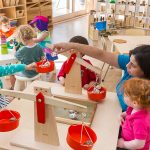Imagine a classroom where kids can explore freely, ask as many questions as they want, and learn at their own pace. That is the beauty of the Montessori Children’s House. Designed for children between 2.5 and 6 years old, this unique environment allows young learners to start their journey in a way that feels natural to them. No rigid schedules, no sitting in rows, just a space where curiosity leads the way.
In the Montessori Children’s House, children are encouraged to make choices, solve problems, and develop confidence in their abilities. They are not just learning facts; they are building a foundation for a lifetime of learning.
What Is The Montessori Children’s House?
The Montessori Children’s House is not like your typical classroom. Here, kids do not sit at desks all day, following the same lesson at the same time. Instead, they move around the room, choosing activities that interest them. Maybe today, it is building with blocks, and tomorrow, it is tracing letters. Whatever they choose, it is all about learning through doing.
The classroom is designed with special materials that help children develop skills like math, reading, and problem-solving. What is remarkable is that many of these materials are self-correcting. So, if a child makes a mistake, they figure it out independently without an adult stepping in to point it out. This approach builds confidence and independence. A key trait Montessori education is known for.
The teacher in the room, called a guide, does not hover or lecture. Instead, they observe and gently guide the children when needed. This gives the kids space to learn for themselves, which is one of the core goals of the Montessori philosophy.
Building Independence And Self-Motivation
One of the biggest lessons kids learn in the Montessori Children’s House is how to be independent. From pouring their own drinks to cleaning up after themselves, children are encouraged to take responsibility for their own tasks. These small moments of responsibility might seem simple, but they help build a child’s sense of independence and confidence.
Self-motivation also plays a big role here. Because kids get to choose what they want to work on, they naturally become more engaged and excited about learning. It is like giving them the steering wheel and letting them drive their own education. When they are driven by curiosity, they are more likely to keep learning even when things get tough. And that is a skill they will carry with them long after they leave the Montessori Children’s House.
Hands-On Learning: A Key To Lifelong Learning
In the Montessori Children’s House, learning is hands-on. Instead of being told what to do or just reading from a book, children use their senses to explore the world around them. Whether it is touching objects, moving things around, or even working with nature, everything is about learning by doing.
For example, in a Montessori math lesson, children might use blocks or beads to physically count and build numbers. This kind of hands-on experience helps kids grasp concepts more deeply and makes learning stick. It is engaging, it is fun, and most importantly, it helps children develop problem-solving skills that will serve them well throughout life.
Social And Emotional Development For Future Success
The Montessori Children’s House does not just focus on academics—it is also a place where kids learn important social and emotional skills. The mixed-age classroom is a big part of this. Older kids naturally take on leadership roles by helping the younger ones, and younger children learn from their peers. It is a beautiful cycle of learning and support.
Every day, children are learning how to share, take turns, and work together. They also learn empathy and kindness, as the Montessori environment encourages positive social interactions. These are the kinds of life skills that help children succeed far beyond the classroom, preparing them for future relationships, teamwork, and even leadership roles.
And emotionally? Montessori children often develop a strong sense of self-confidence. When they have the freedom to make their own choices and work through challenges independently, they build trust in their own abilities. This confidence helps them feel ready to tackle new experiences and challenges, which is crucial for lifelong learning.
Laying The Foundation For Academic Success
The Montessori Children’s House is also great at preparing kids academically. The individualized approach allows children to learn at their own pace, which means no one is held back and no one is pushed too far too fast. If a child is ready to move on to more advanced work, they can do so without waiting for the rest of the class. And if they need more time to master something, that is okay too—they have the space to learn in a way that works best for them.
In this setting, kids are introduced to reading, writing, and math in a hands-on, engaging way. For instance, they might trace letters with their fingers or use beads to count and understand numbers. These activities make learning feel natural and enjoyable, rather than something they are forced to do.
The result? Children develop a deep love for learning. They are not just memorizing facts; they are learning how to think critically and solve problems. And that is the kind of skill set that leads to success, not just in school but in life.
Conclusion
The Montessori Children’s House is more than just a classroom—it is a place where children grow into confident, independent learners. By encouraging self-motivation, hands-on learning, and social development, Montessori education prepares young minds for the future. Children who experience the Montessori Children’s House are not just learning facts, they are developing the skills and attitudes that will help them succeed. They learn how to think for themselves, solve problems, and work with others. Most importantly, they develop a love for learning that will stay with them forever. Montessori education truly sets the stage for lifelong success, helping children become capable, curious, and confident adults.







